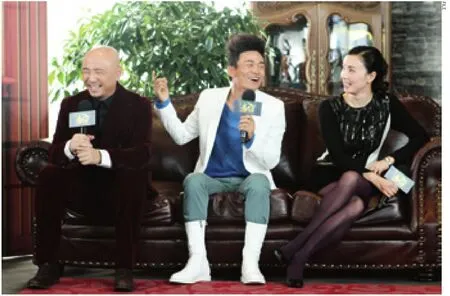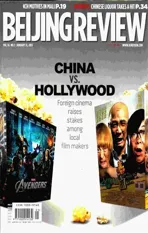A Big Miracle
2013-03-15JiJing
Lost in Thailand sets a box office record for a domestic film By Ji Jing
The low-budget comedy Lost in Thailand has raked in 1.1 billion yuan ($177 million)since its debut on December 12, making it the highest-grossing domestic fi lm in history.It also overtook James Cameron’s 3D Titanic as the top-earning film in Chinese theaters in 2012. With local enthusiasm for the movie still on the up, it is also expected to break the 1.4 billion yuan ($225 million) box of fi ce record set by Avatar in 2010.
The film has outperformed several bigbudget movies such as Feng Xiaogang’s Back to 1942, Jackie Chan’s adventure movie Chinese Zodiac 12, invigorating the domestic movie industry in its fi ght to compete against foreign imports. Statistics from the State Administration of Radio, Film and Television showed that from January to October 2012, domestic movies accounted for 41.4 percent of total box office sales in China, a sharp drop against the previous year.
The comedy features two businessmen from Beijing, Xu Lang and Gao Bo, who travel to Thailand in search of their boss. On the way,Xu is joined by sightseer Wang Bao, who makes a living by selling shallot pies in Beijing. Xu and Wang eventually forms a team called Thailand Legend, utilizing various forms of transport such as planes, trains, motorbikes and elephants while encountering ladyboys, cobras and gangs along the way.
With more than 80 percent of its scenes set in Thailand, the country’s tourism has experienced a boom since the movie’s release.Zha Bingna, Director of the Kunming Of fi ce for the Tourism Authority of Thailand, said the fi lm includes tourist spots, which have enticed a first hand look.

THE LOWDOWN: The main actors of Lost in Thailand Xu Zheng, Wang Baoqiang, and Tao Hong (from left to right) answer questions about the movie at a press conference on November 13, 2012
Why so successful?
The movie sees the debut of Xu Zheng as both character Xu Lang and director.
Some have attributed the film’s luck to timing. It hit the screen when Life of Pi entered its third week, Back to 1942 and The Last Supper their second and when Chinese Zodiac 12 as well as The Last Tycoon were still one week away.
Another important reason concerns favorable audience response, with word-of-mouth having done much to promote the fi lm.
Director Xu Zheng said his film has managed to satisfy a wide spread thirst for comedy amid a slew of more serious films. Back to 1942 features the Henan Province famine that killed up to 3 million people; The Last Supper concerns epic drama set at the beginning of the Han Dynasty (202B.C.-A.D.220) while The Last Tycoon stars Chow Yun-fat as a gangster in Japanese-occupied Shanghai during the 1930s.
Hao Jian, a professor at Beijing Film Academy, said the movie targets university and high school students as well as white collar workers, who constitute the majority of cinema goers in China, by including modern elements such as wireless locators and micro-blogging.

LOST IN CURIOSITY: A boy touches a poster at a movie theater in Nantong, east China’s Jiangsu Province on January 3
A strong production team has also constituted the movie’s success. The movie’s cinematographer Song Xiaofei was nominated as best cinematographer at the 46th Golden Horse Film Festival ceremony while stylist Hao Yi won an award at the 48th Golden Horse Film Festival.World-famous Howie B from Britain joined the team to produce the soundtrack. In addition, the three main actors have gained exceptional fame as comedians in recent years across China.
Critical response
Fans had mixed reactions to the fi lm.
Ren Qingmin, a white collar worker from Suzhou, east China’s Jiangsu Province, said, “The fi lm is very funny. I felt relaxed watching it after a day’s tedious work and was even moved by several episodes.”
People shouldn’t put high expectations on movies because movies only meant to entertain people, Red adds. “As long as they fu lfi ll this task, there is nothing to complain.”
Liu Zhiwei, an engineer at a state-owned company, said, “The movie meets audience needs for simple comedy.”
However, one student from Shandong University was unimpressed, “I haven’t learnt anything from the fi lm, neither do I fi nd it funny.I only laughed because I saw other people do so and didn’t want to appear eccentric.”
Shan Shibing, a journalist with Chongqing Times said the audience found temporary relief in the fi lm. In an era where many people experience inner loss, the theme of traveling offers the hope of finding a spiritual anchorage. The fi lm is undoubtedly a box of fi ce success; however, some experts have noted that box of fi ce results are not the only criterion for judging a movie. Some critics and university professors point to the film’s shortcomings despite its achievements.
Yang Zao, assistant researcher at the Chinese Academy of Social Sciences, listed Lost in Thailand as one of the three most disappointing movies of 2012. He said, “Except for grossing more money than Back to 1942 and The Last Supper, it has nothing else to boast of.I won’t like a movie only because it set a box offi ce record.”
Director and screen writer Wan Li complained on website Yanzhao Dushi that the plot is illogical; some jokes are clichés and the performances are somewhat theatrical.
According to Changjiang Daily, Xiao Su,a professor and writer from Central China Normal University, said the movie makes fun of the small potatoes like Wang and presents the rich businessman Xu Lang as doing whatever he can to make money. This kind of movie does nothing to improve people’s virtue. Xiao claimed the top priority of the cultural industry should be to improve the nation’s literacy and taste. ■
